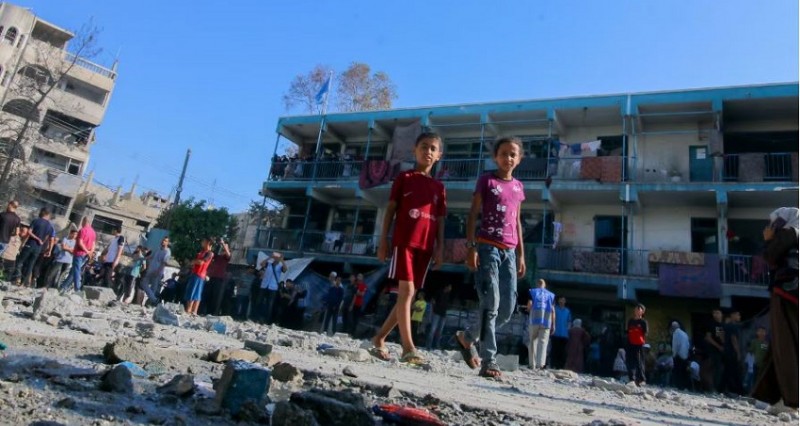
UNITED NATIONS: The United Nations Secretary-General will inform the Security Council next week that both Israel and Hamas are violating children's rights, leaving them exposed to danger in their conflict to eliminate each other.
Annually, the Secretary-General compiles a global list of states and militias threatening children. Previously, this list has included groups like the Kachin Independence Army in Myanmar and, last year, Russian forces during their conflict with Ukraine.
Antonio Guterres sends this list to the Security Council, which then decides on potential actions. The United States, a veto-wielding permanent member, has been hesitant to act against Israel, its longtime ally. Another permanent member, Russia, prevented the Security Council from taking action when Russian forces were blacklisted last year for targeting children, schools, and hospitals in Ukraine.
Israel's inclusion this month will likely intensify global scrutiny of its conduct in Gaza, escalating existing tensions with the UN.
Last year's UN report listed parties involved in "the killing and maiming of children, rape and other forms of sexual violence against children, attacks on schools, hospitals, and protected persons."
On Friday, the head of Guterres' office called Israel's UN ambassador, Gilad Erdan, to inform him that Israel would be included in the upcoming report to the Security Council, said UN spokesman Stephane Dujarric.
Israel reacted with outrage, releasing a video of Erdan criticizing the head of Guterres' office, whom he claimed was on the other end of a phone call, and posting it on social media.
"Hamas will continue to use schools and hospitals even more, as this shameful decision by the Secretary-General will only give Hamas hope to survive and prolong the war and suffering," Erdan said in a statement. "Shame on him!"
Palestinian UN Ambassador Riyad Mansour said adding Israel to the "list of shame" will not bring back the tens of thousands of Palestinian children killed by Israel over decades. "But it is an important step in the right direction," he said in a statement.
Israeli Prime Minister Benjamin Netanyahu said, "The UN put itself on the blacklist of history today," as the move heightened the long-running dispute between Israel and the UN. Even routine interactions between Israel and the world body are now fraught with tension.
The usually calm spokesman for the Secretary-General broke from his usual tone during the noon briefing when asked about the latest development.
"The call was a courtesy extended to countries newly listed in the annex of the report," Dujarric said. "The partial release of that recording on Twitter is shocking and unacceptable and frankly, something I've never seen in my 24 years serving this organization."
Criticism of the Secretary-General's decision appeared to unite Israel's increasingly divided leadership - from right-wing Netanyahu and Erdan to the popular centrist member of the War Cabinet, Benny Gantz.
Gantz cited Israel's first Prime Minister, David Ben-Gurion, saying, "It matters not what the goyim (non-Jews) say, what is important is what the Jews do."
Israel has faced heavy international criticism over civilian casualties in Gaza and questions about whether it has done enough to prevent them in the eight-month-old conflict. Two recent airstrikes in Gaza killed dozens of civilians.
UN agencies warned on Wednesday that over 1 million Palestinians in Gaza could face severe starvation by mid-next month if hostilities continue.
In a joint report, the World Food Program and the Food and Agriculture Organization said hunger is worsening due to severe restrictions on humanitarian access and the collapse of the local food system in the eight-month Israel-Hamas war.
An analysis by the Associated Press of Gaza Health Ministry data shows a significant decline in the proportion of Palestinian women and children killed in the Israel-Hamas war. This trend coincides with Israel's changing battlefield tactics and contradicts the ministry's public statements.
This shift is important because the death rate for women and children is the best proxy for civilian casualties in one of the 21st century's most destructive conflicts. In October, at the start of the war, it was above 60%. By April, it had dropped below 40%.
However, this change went unnoticed for months by the UN and much of the media, and the Hamas-linked Health Ministry has made no effort to correct the record.